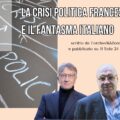In the moment I am writing these few thoughts, I am in Perth, Western Australia, working for the completion of my music PhD. But indeed I cannot call Perth home, being myself an Italian that in the last 6 years is living and working in Macau, China. But in this short article I am not really going to talk about Macau, because I think will be more interesting to reflect a little on something happening in these days in Western Australia that has had some repercussion in the greater China. As we are going to start, better to present facts.
Being tortured these days from jet lag (I was in Italy few days before coming to Perth) I awake very early in the morning, if ever sleep in the night. Being now resident in a University college, I am most days one of the first going to take breakfast in a common hall and in some occasion, like today, I have also access to local newspapers. The one I get today, “The West Australian”, had a title that got immediately my unlimited attention. There is the photo of a man, with a ban sign on it and the title “Bad for Australia”. Who is this man? His name is Clive Palmer, he is a very rich man and a member of Australian parliament. In a very popular TV show, Q&A, on Monday (august 18) he made this declaration, concerning a business controversy he is having with a Chinese partner: “We’ve had three judgments in the Federal Court, in the Supreme Court of Western Australia and in arbitration against these Chinese mongrels. I’m saying that because they’re communists, because they shoot their own people, they haven’t got a justice system and they want to take over this country and we’re not going to let them do it” (The West Australian, August 20). Now, it is obvious that this man need to study a little of the art of diplomacy, even if his problems with Citic group (a Chinese state controlled company of investments) are serious and involve large amount of money. But I do not want to enter in the controversy itself, it is beyond my scope.
I would like to see what were the first reactions to the words of Palmer from other leading Australian personalities. “The Australian” (august 20) offer us a recollection of opinions (even if a little bias may be that the newspaper is owned by Rupert Murdoch, business rival of Clive Palmer); Foreign Minister Julie Bishop affirmed that “he’s using his position to demean the Chinese people because he’s in a legal dispute with a Chinese company….It is abusive and unnecessary language”. The West Australian Premier Colin Barnett defined Palmer “an embarrassment” and then go on saying “he is damaging the international standing in Chinese eyes, both in investment and government circles”. Treasurer Joe Hockey also affirmed that Palmer “is a big beneficiary of a Chinese investment partner, someone that has paid to help him to develop his resources”. On Twitter, Palmer tried to explain: “My #qanda comments not intended to refer to Chinese people but to Chinese company which is taking Australia resources & not paying”. Mmm…not really convincing. I think the more honest comment was the one from former Business Council of Australia President Graham Bradley, that regret the comments for the reason that are “clearly not in the national interest, given that China is our largest trading partners”. I think this last statement speak a truth in a very simple and effective way: no one is really concerned with issues of ethics or friendship, the problem is that Australia need Chinese money. Indeed the figures about the trade of good and services affirm that the one involving China are worth 150 billion Australian Dollars (around 104 billion euros). Now, that is the fact: everyone is terrified not to lose the friendship of Chinese (people, government or whatever) but their money potential. And there is this perception of fear, like if speaking in any way of Chinese offend the whole nation, so one can only speak well (a problem common with other groups and categories that cannot be criticized in any way).
I repeat, the words of Palmer were out of place, but the many frightened reactions are telling a lot about the world we are living today. A world where China is a resource but also represent a reason of fear for many. I am exaggerating? Ok, please read this declarations on the same day and newspaper of PUP (Palmer United Party, ring a bell?) Senator Jacqui Lambie: “If anybody thinks that we should have a national security and defence policy which ignores the threat of a Chinese communist invasion, you’re delusional and got rocks in your head. The communist Chinese military capacity and level of threat to the Western world democracies is at an unprecedented and historical high…Both Labor and the Liberals/Nationals have failed to build and Australian military that is able to defend us and stop our grandchildren from becoming slaves to an aggressive, anti-democratic, totalitarian foreign power”. Wow…China wants to invade Australia? Really? I think the situation got out of control in Senator Lambie’s remarks but what is telling us is that there is this fear in regard to Chinese prominence in our modern world. A fear that probably has a justifications on what I would like to call “Chinese otherness”, an otherness that of course is not felt so strongly in the case of United States, where a lot of citizens are of Europeans descent. This otherness reflect in a different view of the world, in a very self-centered vision of his role in international stage from what it comes a real difficulty to relate with the “other of otherness” (if you allow me to use this phrase).
The influential Pew Research Center, with the words of its Director of Economic Attitudes Bruce Stokes also affirmed something similar: “China is viewed with favor for its economic contribution to the region, but with concern about its territorial ambitions throughout the region” (July 17, 2014, pewglobal.org). Hope that Senator Lambie will not read these words. But the perception is there, a sort of fear because of the objective difficulty to relate with this country for objective and mostly insurmountable cultural differences that affect business practices and the way Chinese relate to the world. Alberto Brambilla, on the Italian Newspaper “Il Foglio” (august 6), quote also a Pew Research Center poll about the opinion of Italians about China where it seems that 70 per cent of Italians has a negative image of China and 75 per cent of them think that its grow is not good for Italy. I am not pretending that China has to care about Italians opinions but probably asking why this is so, would not be out of place. This may be due to the perception created by the many impenetrable Chinatowns in Italian cities and the big difficulty of mixing with Italians.
In these days Pope Francis has visited Korea during an apostolic trip. Having had for the first time the permission to flight over China, he sent two telegrams to Chinese president to wish him and Chinese people every good thing. These are courtesy acts. But for what is given to know, he did not receive any answer. OK, one can be materialistic, atheist, and think that religions are not good for society; but Pope Francis represents more than a billion people and not answering can be seen by malevolent people as a sign of disrespect. But have you heard any one pointing this at loud voice? Of course everyone is silent about that, it seems that disrespect here go only in one direction.
The inopportune words of Mr. Palmer have the side effect to show some reality behind the curtain of media hypocrisy. Chinese people is the heir of a great civilization that deserves huge respect and consideration, as for other civilizations (Greek-roman, Indian, European etc.). But be protagonists on the world stage demands a new understanding and a new consciousness about your own role, the role of others and the way these two factors can positively interact for the general good.
















